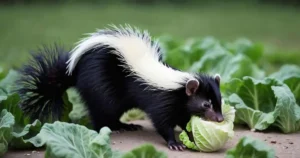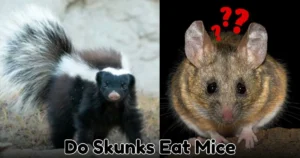Do Skunks Eat Cats? Myths, Facts, and Safety Tips
Having cared for four adorable pet skunks over the years, I’ve been asked everything—from “Do skunks eat cat food?” to the more extreme, “Will skunks eat cats?” If you’re a pet owner, gardener, or just someone curious about backyard wildlife, understanding skunk behavior is essential for peaceful cohabitation.
Let’s get this straight:
❌ No, skunks do not eat cats.
✅ But yes, they will eat cat food—especially if you leave it out overnight.
😬 And yes, they’ve been known to snack on cat poop from litter boxes or the yard (gross, but true).
In this article, I’ll share research-backed facts and firsthand experience to answer the big question: Do skunks eat cats, cat food, or even cat poop? The truth might surprise you.
Skunk Behavior: What Drives Their Actions?
Skunks are nocturnal creatures, most active at dusk and dawn. Understanding their habits helps clarify their interactions with cats.
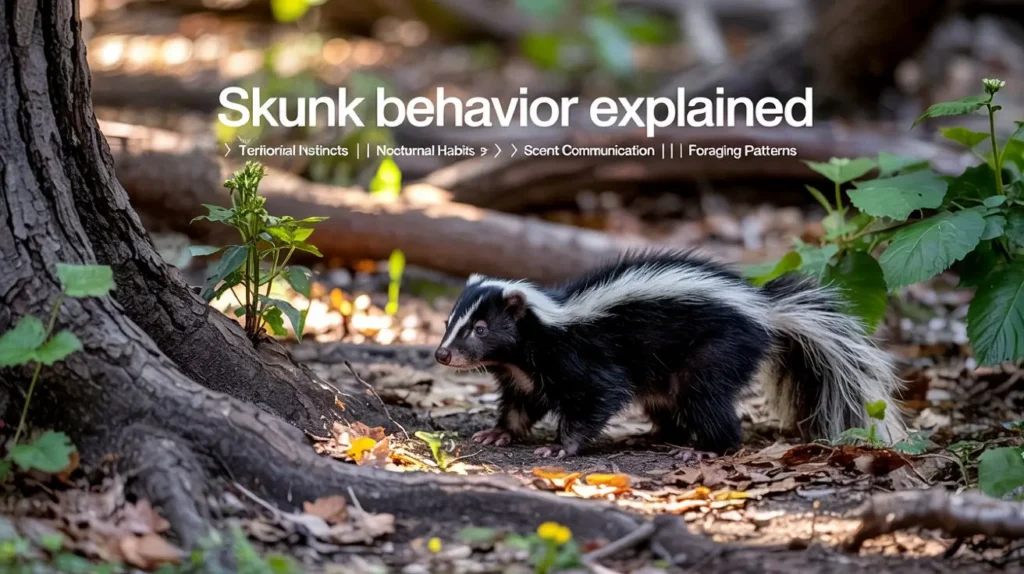
What Do Skunks Normally Eat?
Skunks are opportunistic omnivores. That means they’ll eat just about anything that smells tasty to them.
Their diet typically includes:
- Insects like beetles, crickets, grubs
- Fruits and vegetables such as berries, corn, apples
- Small prey (occasionally)—mice, frogs, bird eggs
- Scavenged food—garbage, pet food, even roadkill
From my own pet skunks, I’ve noticed they especially love cooked eggs, mealworms, and fruit chunks. But they’ll sniff out anything aromatic—which brings us to cat food.
Are Skunks Aggressive?
Skunks are shy and avoid conflict unless threatened. They may act defensively if cornered, protecting young, or competing for food. A 2023 wildlife report noted that skunk attacks on pets are less than 1% of wildlife incidents, making aggression toward cats rare.
Do Skunks Eat Cats?
Let’s clear this up: No, skunks do not eat cats.
They’re scavengers—not predators of your furry friends.
Here’s why:
| Factor | Skunk Behavior |
|---|---|
| Size Comparison | Cats are generally larger and more agile |
| Risk Level | Skunks avoid conflict unless cornered |
| Prey Preference | Insects and scraps are easier meals |
| Personal Experience | My pet skunks don’t even like cat presence! |
🔍 Note: While very rare, a defensive skunk might scratch or spray a cat if threatened—but eating a cat? That’s just a myth.
Do Skunks Eat Cat Food?
Yes, skunks will eat cat food if it’s available—especially the wet kind.
Skunks have a powerful sense of smell and are drawn to high-protein, fish- or meat-based kibble. If you leave a bowl of dry cat food on your porch overnight, don’t be surprised if it disappears—and it might not be your cat doing the snacking!
🧠 Pro Tip from Robert: I once left a half-full bowl of my tabby’s salmon kibble outside by mistake. By morning, a curious skunk had cleaned it out—and left little muddy footprints behind.
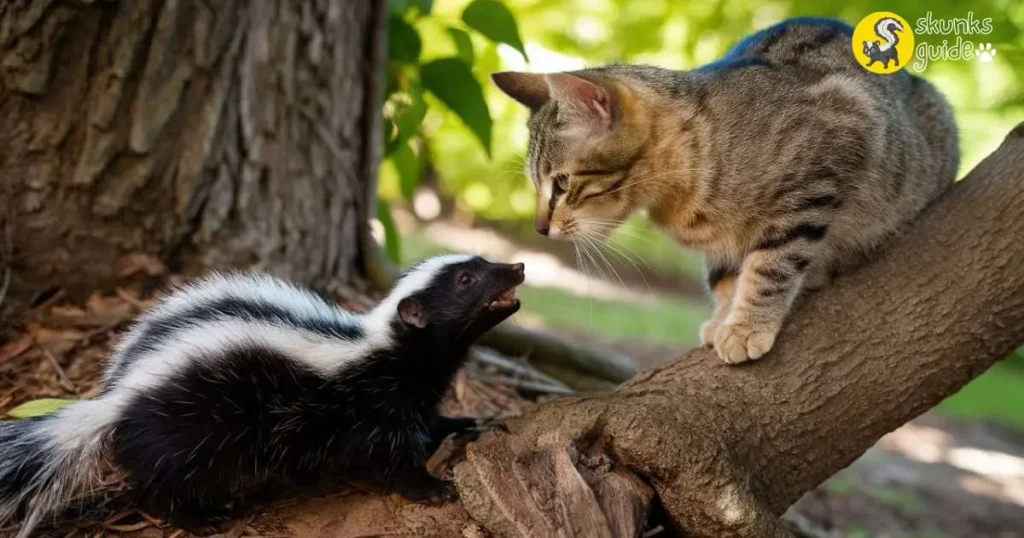
Is It Safe for Skunks to Eat Cat Food?
In moderation? Yes. But as a full-time diet? Definitely not.
Cat food is high in protein and fat, which can harm a skunk’s liver over time. As a skunk parent, I only offer specially formulated omnivore diets and occasional cooked protein—not commercial cat kibble.
Important: If you care for wild skunks, do NOT feed them cat food regularly—it promotes dependence and malnutrition.
Cats As Predators: Turning The Tables
Cats are natural hunters. They can be surprisingly effective in the wild. But do they consider skunks as prey? This section explores the relationship between cats and skunks. It examines how the tables can turn in the animal kingdom.
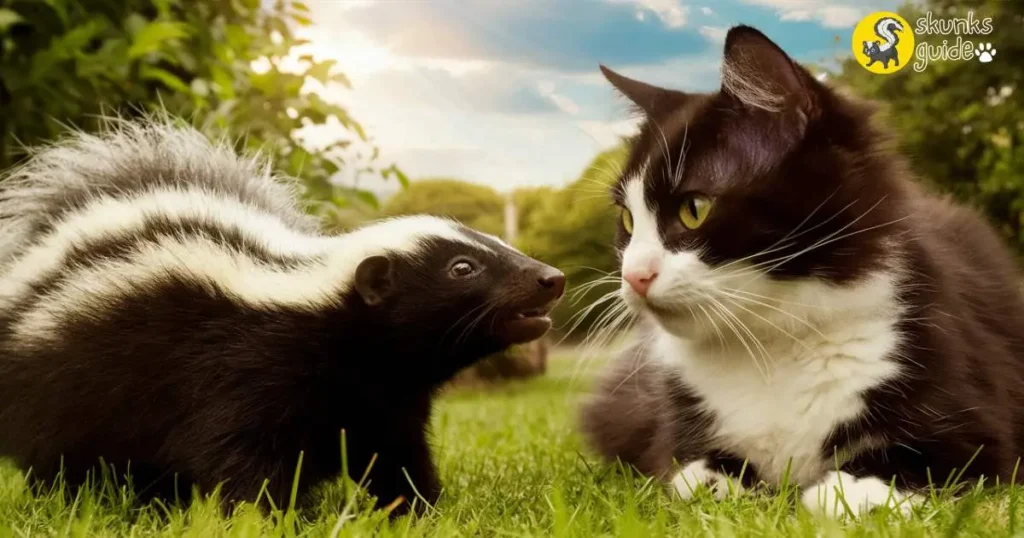
Feline Hunting Instincts
Cats possess strong hunting instincts. They are agile, stealthy, and quick. Here are some key points about their hunting behavior:
- Sharp Claws: Help them catch and hold prey.
- Excellent Vision: Allows them to see in low light.
- Strong Hearing: Detects even the faintest sounds.
- Stealthy Movement: Enables them to sneak up on prey.
These traits make cats efficient hunters. They often target small mammals and birds. But can they go after skunks?
Are Skunks Prey For Cats?
Skunks have a unique defense mechanism. They can spray a foul-smelling liquid. This makes them less appealing as prey. Here’s how cats may view skunks:
| Factor | Cats’ Perspective |
|---|---|
| Size | Skunks are larger than typical prey. |
| Defense Mechanism | Spraying deters many predators, including cats. |
| Behavior | Skunks often stand their ground, making them bold. |
In most cases, cats avoid skunks. They prefer easier targets. While cats are skilled hunters, skunks are not common prey.
Safety Precautions For Pet Owners
Skunks are often misunderstood. They can pose risks to pets, especially cats. Protecting your cat from skunk encounters is essential. Here are some safety precautions every pet owner should follow.
Protecting Cats From Skunks
Preventing skunk encounters starts at home. Follow these tips to keep your cat safe:
- Supervise Outdoor Time: Always watch your cat outside.
- Secure Fencing: Ensure your yard has tall, solid fences.
- Remove Attractants: Keep food and garbage covered.
- Use Motion-Activated Lights: Bright lights can scare skunks away.
- Close Off Hiding Spots: Block access to sheds and under decks.
Mitigating Skunk Encounters
Even with precautions, skunks may still appear. Here’s how to reduce risks:
- Teach Commands: Train your cat to respond to basic commands.
- Use Cat Collars: Consider reflective collars for visibility at night.
- Keep Cats Indoors at Dusk: Skunks are most active after dark.
- Monitor Neighborhood Activity: Stay informed about local wildlife.
By implementing these strategies, you can keep your cat safe from skunks. Protecting your pet is a top priority.
Frequently Asked Questions
What Will A Skunk Do To A Cat?
A skunk may spray a cat if it feels threatened. The spray contains a strong-smelling substance that can irritate the cat’s eyes and nose. Cats may also engage in aggressive behavior if they encounter a skunk. It’s best to keep pets away from skunks to avoid conflict.
Do Skunks And Cats Fight?
Skunks and cats can fight, especially if they feel threatened. Skunks may spray when cornered, causing discomfort. Cats usually avoid confrontations but will defend themselves if necessary. It’s best to keep them apart to prevent conflicts. Always supervise pets in areas where skunks are present.
Are Cats Scared Of Skunks?
Cats may be wary of skunks due to their strong odor and potential for aggression. The scent of a skunk can be overwhelming, prompting cats to avoid them. While not universally scared, many cats instinctively steer clear of these creatures to protect themselves from possible harm.
Conclusion
Skunks are generally not a threat to cats. They prefer insects, fruits, and small rodents. Encounters may happen, but they rarely result in harm. Keeping your cat indoors can reduce risks. Understanding skunk behavior helps pet owners maintain a safe environment.


